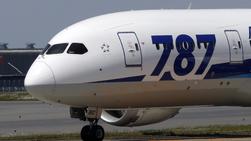 In this file photo, a Boeing 787 lands after a test flight at Haneda International Airport in Tokyo. (PHOTO / AP)
In this file photo, a Boeing 787 lands after a test flight at Haneda International Airport in Tokyo. (PHOTO / AP)
With China's economy on the rebound, demand for air travel in the world's second-largest economy also is taking off. One US company that stands to benefit from that recovery, aircraft maker Boeing, could have jeopardized its prospects due to a planned weapons sale by its defense unit to Taiwan.
Boeing is the most vulnerable of three US companies targeted by Beijing for proposed sanctions, with China home to one of the largest fleets of Boeing planes, TS Lombard economist Rory Green told Barron's, a prominent US business weekly.
China's civil aviation market is massive and growing at a rapid pace. The country has been the first to emerge from the coronavirus pandemic and this month reported GDP growth of 4.9 percent for the third quarter. It is likely to be the first to resume jet purchases because it is the only major economy returning to pre-COVID levels of air travel, Barron's reported.
"It isn't a market Boeing can ignore," Green said.
ALSO READ: Boeing set to lay off nearly 7,000 due to outbreak
Chinese Foreign Ministry spokesman Zhao Lijian said on Monday: "To safeguard our national interests, China decided to take necessary measures and levy sanctions on US companies such as Lockheed Martin, Boeing Defense, and Raytheon, and those individuals and companies who behaved badly in the process of the arms sales."
Shares in the three companies were sold off on Monday.
Long-term benefits
A spokesman for Boeing said in an emailed statement to Reuters on Monday that the company's partnership with China's aviation community had long-term benefits and that Boeing remained committed to it.
Boeing Defense, Space& Security is a division of Boeing based in Arlington, Virginia.
While any Chinese sanctions over the arms sales could be limited to Boeing's defense unit, it could make it tougher for the Chicago-based parent company to win certification in China for its grounded 737 Max jet, according to investing website The Motley Fool. The Max was involved in two crashes-in Indonesia and Ethiopia in 2018 and 2019-that killed 346 people.
China had almost 100 Max planes in operation prior to the grounding and doesn't have a timetable for allowing the jet back into the air, Feng Zhenglin, director of the Civil Aviation Administration of China, said in Beijing last week. China was the first country to ground the Max.
I believe China Inc is going to flex its muscles like never before in commercial matters.
Jim Collins, chief executive officer of Excelsior Capital Partners
Jim Collins, chief executive officer of Excelsior Capital Partners, said: "I believe China Inc is going to flex its muscles like never before in commercial matters."
Boeing on Wednesday reported its fourth-straight quarterly loss, at US$1.39 per share, although it was less than forecasts of a US$2.52 per share loss, according to Refinitiv data. Revenue fell 29 percent to US$14.14 billion but topped analysts' estimates of US$13.9 billion.
CEO David Calhoun said Boeing now expects to eliminate some 30,000 jobs to reach a workforce of around 130,000 by the end of 2021. That is 11,000 more than previously discussed, with 7,000 extra jobs going through increased voluntary or involuntary layoffs and the rest through attrition.
He predicted airline traffic would end the year at around 30 to 35 percent of 2019 levels, with a return to pre-pandemic levels in about three years.
Boeing has forecast that Chinese airlines will need more than 8,000 new passenger airplanes over the next 20 years, the most of any country.
Raytheon Technologies, in its third-quarter earnings report on Tuesday, saw its Collins Aerospace and Pratt & Whitney divisions' segment sales drop 34 percent year-over-year, with Collins seeing profit drop more than 90 percent, and Pratt & Whitney reversing a year-earlier profit.
READ MORE: China voices strong opposition to US arms sales to Taiwan
Agencies contributed to this story.
Contact the writer at hengweili@chinadailyusa.com


